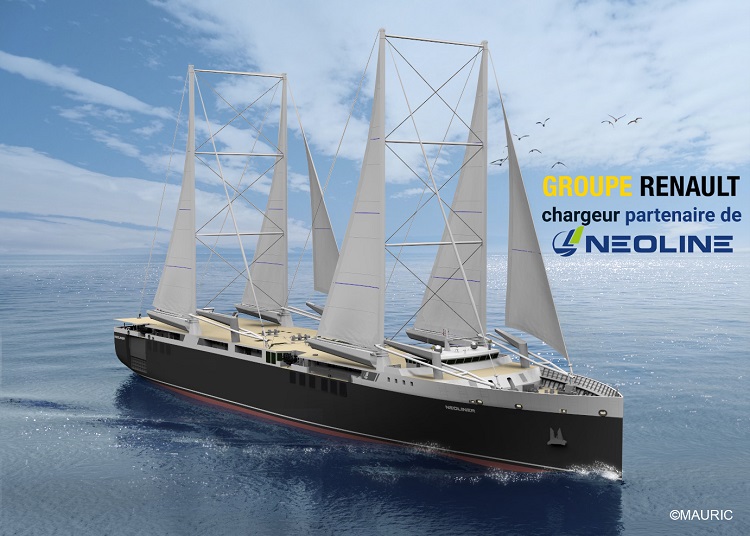Car Maker Partners in Sailing Ro-Ro Project
Car manufacturer, Groupe Renault, is partnering with French designer and operator of cargo sailing ships, NEOLINE, to reduce the carbon footprint of the Group’s supply chain.
NEOLINE has designed a 136-meter ro-ro with 4,200 square meters of sail area it says has the potential to reduce CO2 emissions by up to 90 percent through the use of wind power primarily, combined with a cost-cutting speed and optimized energy mix, compared to a traditional cargo ship on an equivalent route. The objective is to build two ships based on this model and to commission the vessels by 2020-2021 on a pilot route joining Saint-Nazaire in France, the U.S. Eastern seaboard and Saint-Pierre and Miquelon (off the coast of Newfoundland in Canada).
"We are delighted to see this news and congratulate Groupe Renault on taking this decisive step towards a fully decarbonised supply chain with these well designed primary wind propulsion vessels," said Gavin Allwright, Secretary General of the International Windship Association (IWSA). "This development is great news for the NEOLINE team, but also for wind propulsion innovators as a whole with cargo owners and ship operators increasingly considering wind propulsion as a viable, cost effective low carbon option for their fleets. We can't wait to see these vessels launched and operational in the not too distant future."

Nearly 60 percent of the Groupe Renault's parts and vehicles are transported by sea. The Group has signed a three-year partnership with NEOLINE as part of a commitment to reduce its supply chain carbon footprint by six percent by 2022. Jean-Philippe Hermine, Vice President, Strategic Environmental Planning Groupe Renault, said: “Groupe Renault’s objective is to reduce the environmental impact of each vehicle throughout its entire life cycle, from parts transportation up to delivery and end-of-life processing.”
Groupe Renault has spent nearly 10 years working to identify the most environmentally sustainable solutions: for example, optimizing the fill rates of containers and trucks, producing eco-friendly packaging and implementing a multimodal system. Other initiatives underway include the use of natural gas transportation between parts suppliers and production sites, the evaluation of transporters’ environmental performance, the modernization of truck fleets and the optimization of flows to reduce the number of kilometers traveled and to eliminate empty trips.
Groupe Renault, which has been making cars since 1898, is now an international corporation with a presence in 134 countries and sales of 3.76 million vehicles in 2017. Its five brands are Renault, Dacia, Renault Samsung Motors, Alpine and LADA.

that matters most
Get the latest maritime news delivered to your inbox daily.
Main Characteristics
Length: 136 meters (446 feet)
Width: 24.2 meters (79 feet)
Displacement: 11,000t
Deadweight: 5,000t
Total sail area: 4,200m²
Power (diesel-electric): 4,000kW
Max. speed with engine: 14 knots
Crew: 14
Passengers: 12
